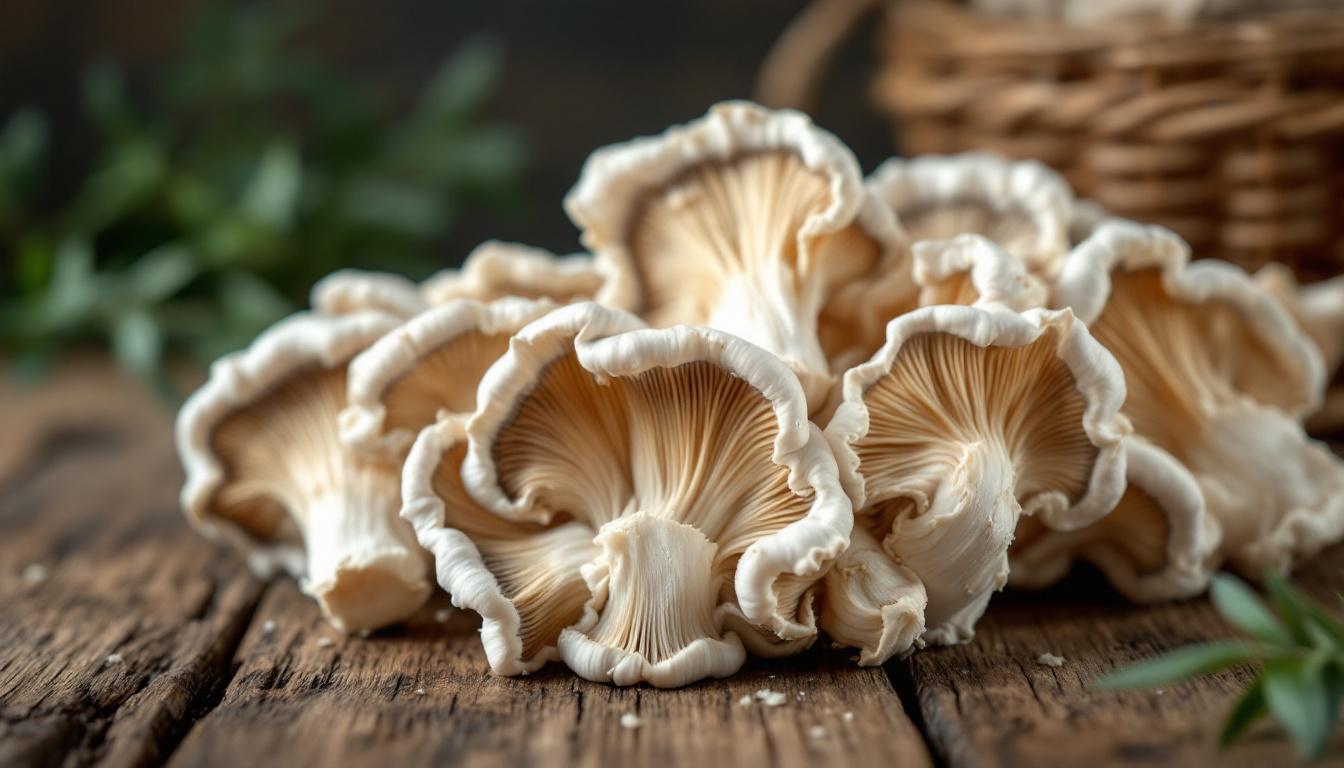At Ultimate Treat, we are thrilled to delve into the intriguing world of oyster mushrooms. These versatile fungi have not only charmed us with their delightful taste but also with their impressive health benefits.
In this post, we’ll dive into oyster mushrooms’ health benefits and side effects, examining their nutritional profile and discussing potential precautions. Whether you’re a mushroom enthusiast or simply curious about incorporating more plant-based options into your diet, this guide will provide valuable insights.
What’s in Oyster Mushrooms?
Nutrient-Dense and Low-Calorie
Oyster mushrooms offer an impressive nutritional profile with minimal calories. A 100-gram serving contains just 33 calories, making it an excellent choice for weight-conscious individuals. These fungi are also low in fat, with less than 1 gram per serving.
Protein Powerhouse
One standout feature of oyster mushrooms is their protein content. With approximately 3.3g of protein per 100 grams, they provide a valuable protein source for vegetarians and vegans. This protein content is similar to broccoli, which contains 2.8g of protein per 100 grams, setting oyster mushrooms apart in the plant-based protein category.
Fibre and Carbohydrates
Oyster mushrooms contain good dietary fibre (2.3 grams per 100-gram serving). This fibre supports digestive health and helps maintain stable blood sugar levels. The total carbohydrate content is around 5 grams per serving, making oyster mushrooms suitable for those following ketogenic or low-carb diets.
Micronutrient Abundance
These mushrooms are rich in essential vitamins and minerals. They contain high B vitamins, including niacin (27% of the Daily Value) and pantothenic acid (22% of the Daily Value). Oyster mushrooms also provide significant amounts of potassium, which is key in heart function and blood pressure regulation.
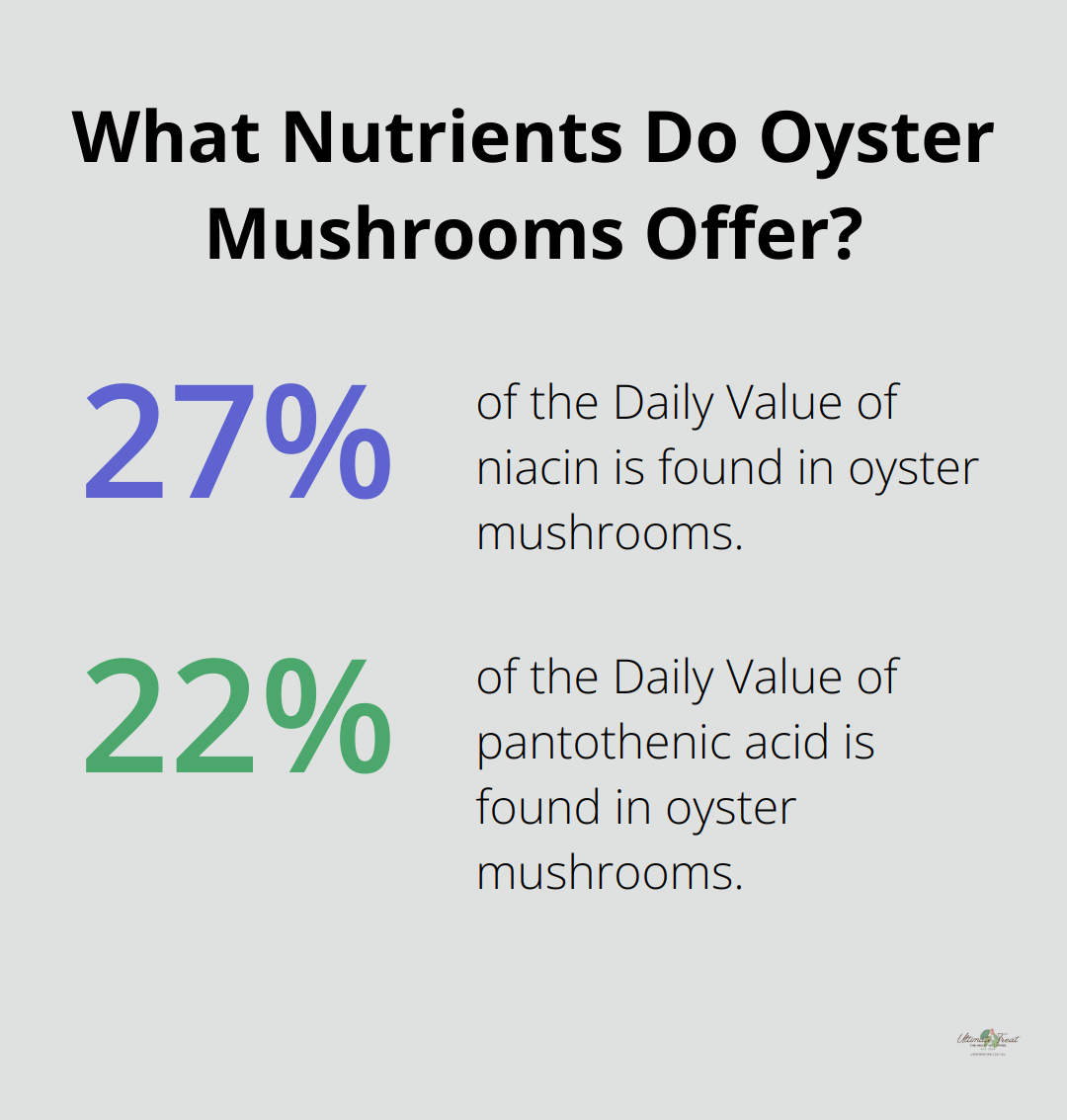
Oyster mushrooms also contain selenium (essential for thyroid function and immune health) and antioxidants like ergothioneine, which combat oxidative stress in the body.
Comparison with Other Mushrooms
Oyster mushrooms stand out for their higher protein content than other edible mushrooms. While button mushrooms are more common, oyster mushrooms offer a more diverse nutrient profile. They contain more protein than shiitake mushrooms and have a higher antioxidant content than many other varieties.
The nutritional benefits of mushrooms (including oyster mushrooms) align with the health-focused approach of companies like Ultimate Treat, which incorporates beneficial fungi such as Chaga and Lion’s Mane into their premium coffee blend. While oyster mushrooms aren’t part of Ultimate Treat’s current product line, their impressive nutritional profile reflects its commitment to providing health-boosting ingredients.
As we explore the health benefits of oyster mushrooms in the next section, you’ll discover how these nutrient-packed fungi can positively impact various aspects of your well-being.
How Oyster Mushrooms Boost Your Health
Oyster mushrooms offer a range of health benefits that can significantly impact your well-being. Let’s explore the various ways these versatile fungi can enhance your health.
Immune System Strengthening
Oyster mushrooms contain beta-glucans, complex sugars that enhance immune function. A Journal of Medicinal Food study found that golden oyster mushrooms increased natural killer cell activity, which fights off infections and cancer cells. Adding 100 grams of oyster mushrooms to your diet thrice a week could give your immune system a noticeable boost.
Heart Health Support
The high fibre content in oyster mushrooms (particularly beta-glucans) can help lower cholesterol levels. A randomized controlled trial showed that consuming 30 grams of dried oyster mushrooms daily for 21 days reduced total cholesterol and triglycerides. This effect, combined with the mushrooms’ potassium content (which helps regulate blood pressure), makes oyster mushrooms a heart-healthy food choice.
Potential Cancer-Fighting Properties
Oyster mushrooms contain antioxidants, which may lower cancer risk. However, research has not proven these mushrooms can prevent cancer. More human studies are needed to understand their potential anti-cancer properties fully.
Blood Sugar Regulation
Oyster mushrooms could be a valuable addition to the diet for those managing diabetes or at risk of developing it. Research indicated that consuming powdered oyster mushrooms might reduce post-meal blood sugar levels in people with type 2 diabetes. This effect is attributed to the mushrooms’ ability to enhance sugar utilization in body tissues.
Gut Health Promotion
The fibre in oyster mushrooms acts as a prebiotic, feeding beneficial gut bacteria. A study found that oyster mushrooms increased the production of short-chain fatty acids in the gut, essential for maintaining a healthy digestive system. Try to include a serving of oyster mushrooms in your meals 2-3 times a week to support your gut health.
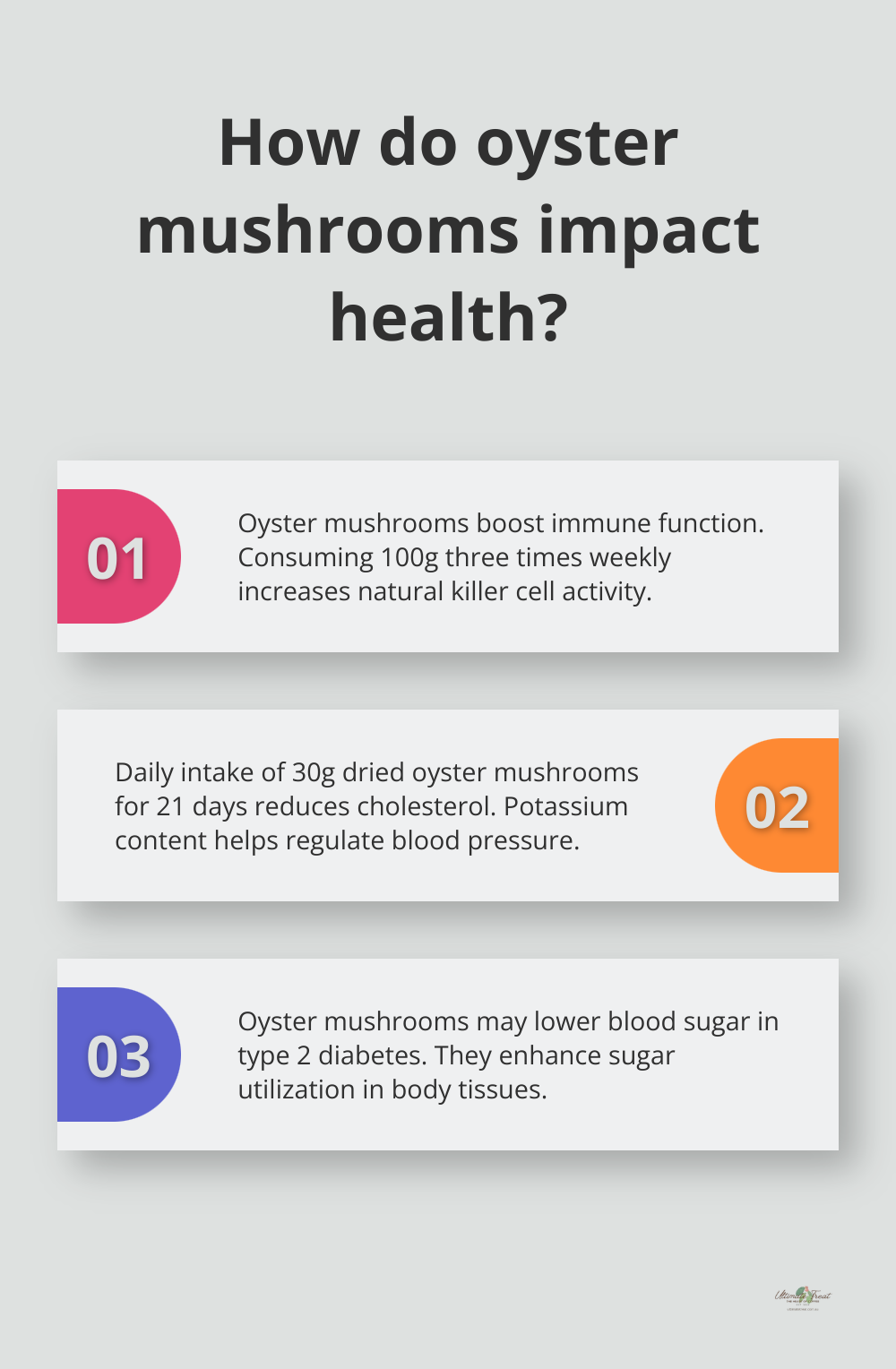
While oyster mushrooms offer these impressive health benefits, it’s important to note that they should be part of a balanced diet. The following section will explore potential side effects and precautions when incorporating oyster mushrooms into your diet.
Are There Risks to Eating Oyster Mushrooms?
Allergic Reactions: More Common Than You Think
Fungal allergies affect 3-10% of the population worldwide. Symptoms range from mild itching to severe anaphylaxis. If you’ve never eaten oyster mushrooms, start with a small amount and watch for adverse reactions. Common signs include hives, swelling, and difficulty breathing. Stop consumption immediately and consult a healthcare professional if you experience these symptoms.
Medication Interactions: A Hidden Concern
Oyster mushrooms contain compounds that may interact with certain medications. Their high potassium content could interfere with blood pressure medications or diuretics. Some mushrooms, including oyster varieties, can affect the metabolism of drugs processed by the liver (Journal of Clinical Pharmacy and Therapeutics). Consult your doctor before adding oyster mushrooms to your diet regularly if you’re on any medications, especially those for blood pressure or diabetes.
Contamination: A Real Risk
Wild oyster mushrooms can accumulate heavy metals from their environment, with the substrate chemical composition strongly affecting this accumulation. To minimize this risk, purchase oyster mushrooms from reputable sources or grow your own. If you forage, only do so with an expert guide and in areas known to be pollution-free.
Overconsumption: Too Much of a Good Thing
While oyster mushrooms are generally safe, excessive consumption can lead to digestive issues. Some people report bloating or gas when eating large quantities. A serving size of about 100 grams (3.5 ounces) daily is typically considered safe for adults. If you’re new to eating oyster mushrooms, start with smaller portions and gradually increase your intake to assess your tolerance.
Quality Matters: Choose Wisely
The source and quality of oyster mushrooms significantly impact their safety and nutritional value. Try to purchase from reputable suppliers who follow strict cultivation and handling practices. This approach minimizes the risk of contamination and ensures you receive the full health benefits of these mushrooms.
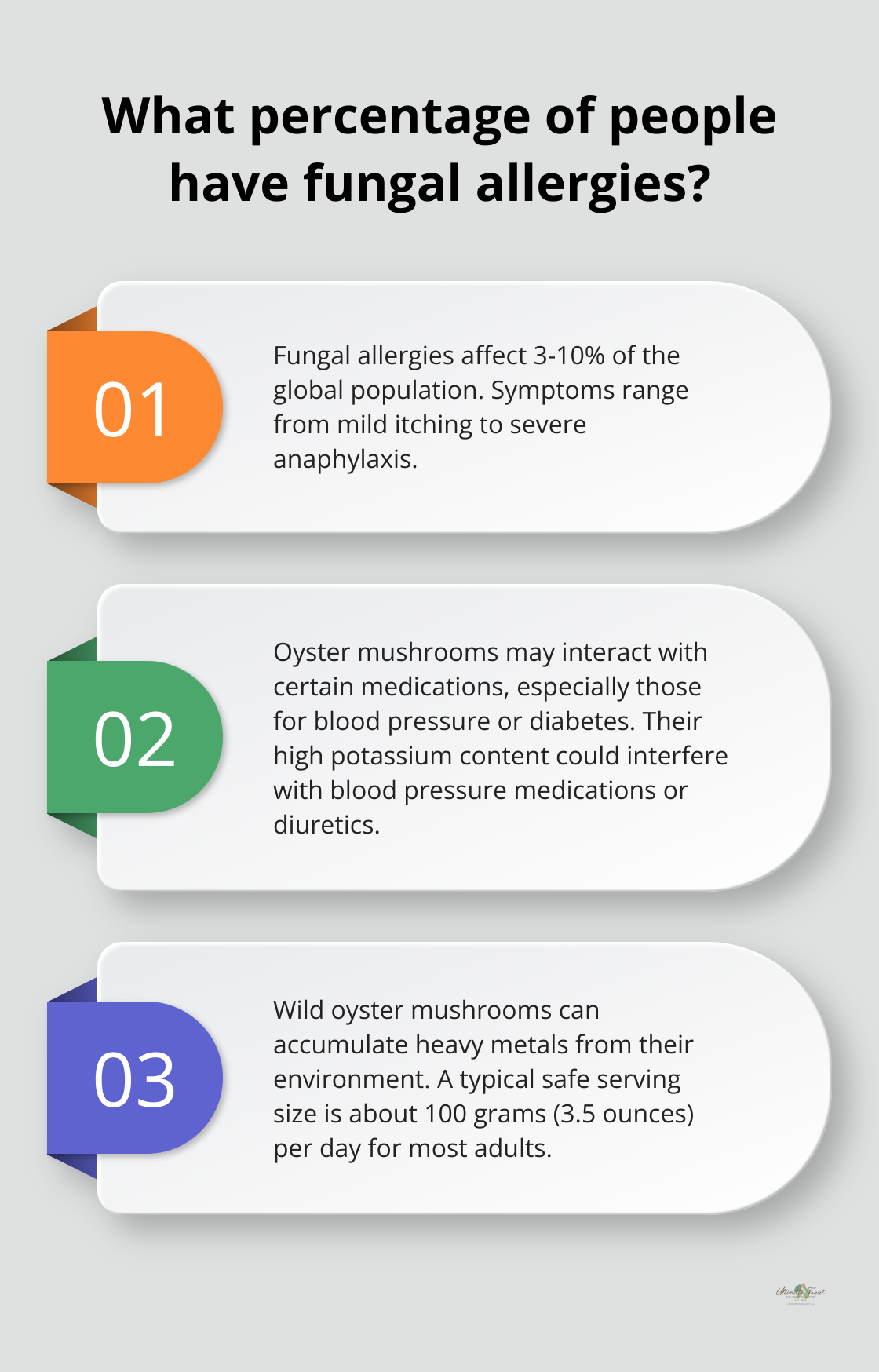
Final Thoughts
Oyster mushrooms provide numerous health benefits, from heart health support to potential blood sugar regulation. Their high protein content and essential vitamins make them a valuable dietary addition. However, users must consider possible side effects and take necessary precautions when consuming these mushrooms.
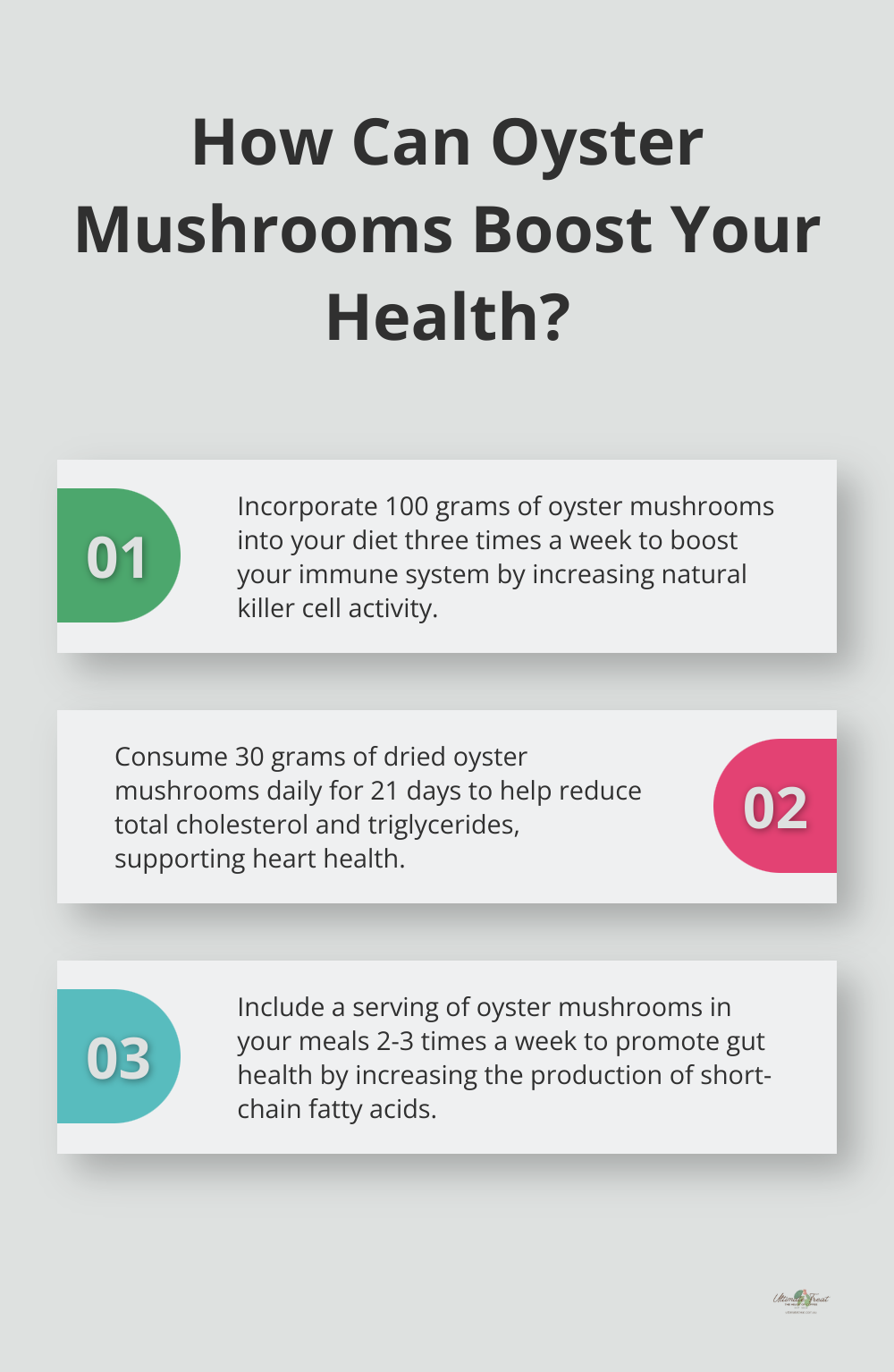
Moderation proves essential when adding oyster mushrooms to meals. Users should adhere to recommended serving sizes and increase intake gradually to assess tolerance. Proper sourcing also matters; purchasing from reputable suppliers or growing your own ensures quality and minimizes contamination risks.
Ultimate Treat offers a unique way to incorporate functional mushrooms into your daily routine. Our organic coffee infused with Chaga and Lion’s Mane mushrooms provides a delicious option to support mental clarity and focus. This blend combines the power of mushrooms with premium coffee, offering a convenient method to enjoy the benefits of functional fungi.

